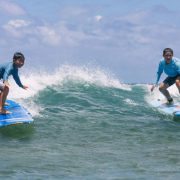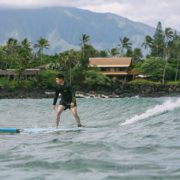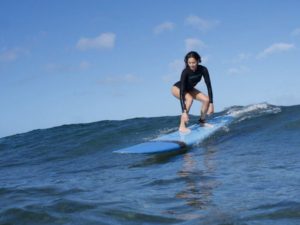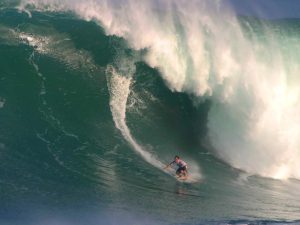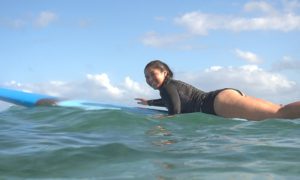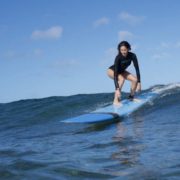Learn How to Surf: A Beginner’s Guide to Catching Waves on Oahu’s North Shore
Ever thought about surfing? Like, really riding those waves, feeling the rush of the ocean under your feet, and just totally vibing with nature? Well, you’re in the right spot, especially if you’ve been dreaming about conquering the waves on the legendary North Shore of Oahu. This place isn’t just a surfer’s paradise; it’s where beginners can transform into pros with the right guidance, patience, and a whole lot of practice.
The Thrill of Surfing on Oahu’s North Shore

There are spots perfect for beginners, where the waves invite you rather than intimidate you. Imagine starting your surf story on the same shores where countless legends have made their mark. Pretty cool, right? And with a little instruction, you’ll be able to catch your first wave in no time.
The Basics of Surfing
First things first, you gotta understand what you’re dealing with. Surfboards come in all shapes and sizes, and as a newbie, you’ll likely start with a longboard. It’s more stable and forgiving, perfect for learning the ropes. And waves? They’re not all created equal.
We’ve got reef, beach, and point breaks, each offering a unique ride. For beginners, 1-2 ft waves are your best friends. They’re gentle enough to help you get a feel for standing up and riding without sending you tumbling on the first try.
Safety’s a big deal, too. Surfing’s fun, but Mother Nature demands respect. That means knowing where you can surf safely, understanding surf etiquette (yeah, that’s a thing), and always, always, always having your trusty leash and surf wax.
Choosing the Right Surf School on Oahu
Now, for the real deal—finding a surf school. The North Shore Oahu Surf School stands out and for good reasons. Led by World-Class Pro Surfer Kala Grace, you’re not just learning to surf; you’re getting schooled in the ways of the ocean by locals who’ve lived and breathed surfing their entire lives.
These guys offer everything from private beginner surfing lessons to advanced surf instruction, guaranteeing 100% satisfaction with a promise to give your money back if you’re not stoked about your experience. Plus, they pick the best spots based on conditions, usually between Chuns Reef and Puaena Point Beach Park, ensuring you learn in the best waters.
Your First Lesson: Diving In
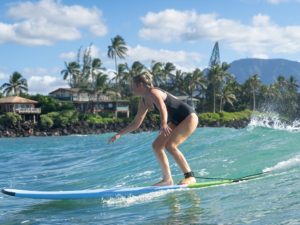
Quick Tips for Your First Surf Lesson:
- Listen to Your Surf Instructor: They know what they’re doing and are there to help you have fun and be safe.
- Keep Your Chin Up: Literally. Holding your head up helps with balance and makes it easier to pop up.
- Don’t Be Afraid to Fall: It’s part of the learning process, and trust us; you’ll fall a lot. Just get back on your board and keep trying.
- Have Fun: Surfing is all about enjoying the moment, so don’t take yourself too seriously and have a good time!
Progressing Your Surfing Skills
Catching your first wave is just the beginning. Surfing is about constant learning and adapting. You’ll work on your paddling technique, timing for catching waves, and finding that sweet spot for your stance on the board. It’s a process, but every session brings you closer to feeling like one with the wave.
Beginner surf lessons for the basics:
- Master the Pop-Up: It’s a fundamental part of surfing, and once you nail it, it’ll become second nature.
- Learn to Read the Waves: Understanding how waves form and break will help you choose the right one to catch and ride.
- Practice, Practice, Practice: The more time you spend in the water, the faster you’ll improve. Surfing is all about muscle memory.
- Have a Positive Attitude: Believe in yourself, be patient with your progress, and always have fun!
Intermediate North Shore Surf lessons for taking it to the next level:
- Perfect Your Turns: Once you’ve got the basics down, it’s time to start working on your turns to take your surfing to the next level.
- Try Different Boards: Experimenting with different board types can open up new possibilities and challenges for your surfing skills.
- Learn About Wind and Swell Forecasting: Understanding weather conditions and how they affect waves can help you plan your surf sessions accordingly.
Advanced surfing lessons for becoming a pro:
- Master Advanced Techniques: Work on more complex maneuvers like aerials, barrels, and cutbacks to take your surfing to the next level.
- Get Comfortable in Different Conditions: Test yourself in various conditions, such as bigger waves and changing tide levels, to improve overall skill and confidence.
- Participate in Competitions: Joining surf competitions is a great way to push yourself and gain experience, whether it’s for fun or as a career pursuit.
The North Shore Surfing Community

So come join the North Shore surfing community and experience the endless possibilities of this beautiful, dynamic sport. Whether you’re a beginner just starting your journey or an experienced surfer looking for new challenges, there’s always more to discover in the world of surfing.
Surfing Beyond the North Shore
While the North Shore of Oahu is known for its world-renowned surf breaks, it’s not the only place to catch a wave in Hawaii. The islands are home to numerous surf spots, each offering a unique experience and showcasing the diverse landscapes of Hawaii. Some other popular surfing destinations in Hawaii include:
- Waikiki, Oahu: Known for its calm waters and iconic Diamond Head backdrop, Waikiki is another great spot for beginners to practice their skills.
- Honolua Bay, Maui: This picturesque bay offers powerful waves for more experienced surfers.
- Hanalei Bay, Kauai: With its stunning scenery and consistent surf, Hanalei Bay is a favorite among locals and visitors alike.
- Jaws, Maui: This infamous big wave spot draws in professional surfers from around the world to tackle its massive swells.
No matter where you choose to ride the waves in Hawaii, always remember to respect the ocean and follow proper surfing etiquette to ensure a safe and enjoyable experience for everyone. Ultimately, the spirit of aloha and the love for surfing are what bring people together in this paradise destination, making it a truly unforgettable experience for any surfer.
Ready to Ride?
Feeling pumped to grab a board and hit the waves? We thought so! Remember, every pro surfer was once a beginner. It’s all about taking that first step… or paddle, in this case. Contact us today to share your thoughts, experiences, or dreams about surfing. And if you’re ready to take the plunge and book your first lesson, the North Shore Oahu Surf School is waiting to welcome you to the family.

